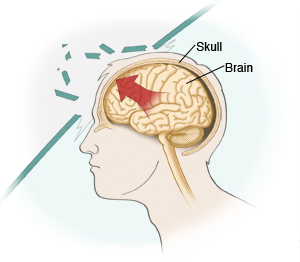Head Injury (Adult)
You have had a head injury and it does not appear serious at this time. Symptoms of a more serious problem, such as a mild brain injury (concussion), bruising or bleeding in the brain, may appear later. For this reason, you or someone caring for you will need to watch for the symptoms listed below. Once you are home, be sure to follow any care instructions you are given.

Home care
Watch for the following symptoms
Seek emergency medical care if you have any of these symptoms over the next hours to days:
- Headache
- Nausea or vomiting
- Dizziness or a spinning sensation
- Lightheadedness
- Sensitivity to light or noise
- Unusual sleepiness or grogginess
- Trouble falling asleep
- Personality changes or moodiness
- Vision changes or inability to focus the eyes
- Memory loss
- Confusion
- Trouble walking or problems with balance;
- Clumsiness or poor coordination
- Loss of consciousness (even for a short time)
- Inability to be awakened
- Stiff neck
- Weakness or numbness in any part of the body or poor muscle control
- Leaking clear fluid from the nose or ear
- Seizures
General care
- If you were prescribed medicines for pain, use them as directed. Note: Do not take other medicines for pain without talking to your provider first.
- To help reduce swelling and pain, apply a cold source to the injured area for up to 20 minutes at a time. Do this as often as directed. Use a cold pack or bag of ice wrapped in a thin towel. Never apply a cold source directly to the skin.
- If you have cuts or scrapes as a result of your head injury, care for them as directed.
- For the next 24 hours (or longer, if instructed):
- Do not drink alcohol, use sedatives or other medicines that make you sleepy.
- Do not drive or operate machinery.
- Do not do anything strenuous, such as heavy lifting or straining.
- Do not return to sports or other activities that could result in another head injury.
-
Limit tasks that require concentration. This includes reading, using a smartphone or computer, watching TV, and playing video games.
-
Don’t return to sports or other activities that could result in another head injury until approved by your healthcare provider.
Follow-up care
Follow up with your healthcare provider, or as directed. If imaging tests were done, they will be reviewed by a doctor. You will be told the results and any new findings that may affect your care.
When to seek medical advice
Call your healthcare provider right away if any of these occur:
- Pain does not get better or worsens
- New or increased swelling or bruising
- Fever of 100.4°F (38°C) or higher, or as directed by your provider
- Increased redness, warmth, drainage or bleeding from the injured area
- Fluid drainage or bleeding from the nose or ears
- Any depression or bony abnormality in the injured area
- Persistent confusion or lethargy
- Personality changes
- Bruising behind the ears or bruising around the eyes
© 2000-2021 The StayWell Company, LLC. All rights reserved. This information is not intended as a substitute for professional medical care. Always follow your healthcare professional's instructions. This information has been modified by your health care provider with permission from the publisher.